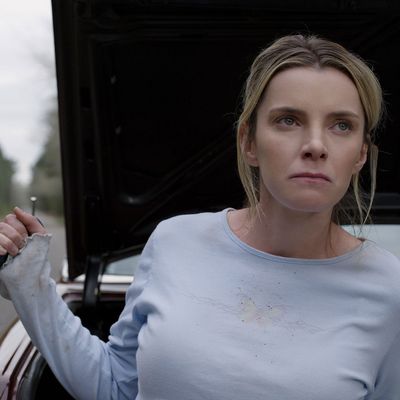
The best take on The Hunt comes from its own main character, Crystal, a Mississippi car-rental employee and veteran who’s one of a dozen people who are abducted and stalked for sport for reasons initially unclear. Crystal — played by GLOW’s Betty Gilpin with the kind of delectably unflappable timing ’80s action franchises were once built on — muses that interpreting the reasoning behind what’s been happening to her depends on whether the people responsible are “smart pretending to be idiots or idiots pretending to be smart.” Technically, she’s talking about her trigger-happy captors, a group of wealthy liberals searching for kicks and catharsis by killing a curated selection of members of the alt-right. But it’s an observation that, while bluntly stated, works just as well when applied to the movie she’s at the center of.
If you take The Hunt as the former, then it’s just a nasty exploitation flick, a riff on “The Most Dangerous Game” with a thin veneer of contemporary context. But it’s almost impossible to see it as anything but the latter — a splattery satire that’s actually trying to say something about the polarized moment in which we live. Courtesy of the conservative ire the film attracted before its initial planned release last September, ire that made its way up to the attention of the president, the garbled commentary that The Hunt offers up is pretty much guaranteed to be taken more seriously than the creative team behind it (including director Craig Zobel and writers Nick Cuse and Damon Lindelof) likely ever expected. There’s a bountiful, extremely 2020 sort of irony to the way The Hunt depicts cancel culture, given that the movie itself experienced a ludicrous temporary cancellation. It’s a two-hour testament to the perils of casually throwing around terms like “deplorables” and “godless elite” without actually appreciating how little meaning they may have, and how much baggage they’ve nevertheless accrued.
The script from The Hunt often feels like it was generated by pulling randomly from a word cloud from hell, with both sides spitting internet invective at one another like armies of Twitter bots — “cuck,” “snowflake,” “crisis actors,” “hick.” The hunted are a collection of white nationalists, Fox News fans, big-game hunters, and homophobes who wake up in the middle of the woods to find themselves being armed and then being shot at, as though every message board conspiracy theory they’d ever delved into were true. The hunters, led by Athena (Hilary Swank), are high-minded, high-income hypocrites who all take pride in their progressive conscientiousness (“Ava DuVernay just liked one of my posts!” is one of the quips that actually lands) while barely tamping down their vitriolic disdain. The film’s canniest insight is to have its vengeful pursuers insist on trying to get their prey to confess to their respective transgressions before they’re killed, because being told they’re right would be a truer reward than the self-righteous murders that inevitably follow.
The Hunt isn’t a total mishap, not with Gilpin being as good as she is and with Zobel’s gleeful aptitude for violence, but that’s what’s so exasperating about it. It has a habit of getting in its own way with trollish tendencies whenever it starts to build momentum. It’s regrettable that, despite all of its jabs at relevance, the movie has no desire to actually dig into the details of the anger felt by either side of the bloodsport event it imagines. In The Hunt, both sides are treated as equally foolish, South Park style, just snobs and rubes — which feels unbearably glib when the sins of one side are outrageously fictional and the sins of the other draw inspiration from real world examples like the Unite the Right rally and the Westboro Baptist Church. In order to present its political divide as a fundamentally cultural one, it settles on a group of characters who appear to have no direct skin in the game, and then treats the idea that might actually care anyway as unfathomable. For the people on screen, issues like racism and economic inequality amount to just cause for yelling, aside from the family of refugees rushed through a scene as an admission that there are people who have it bad, they’re just far away. It’s a privileged child’s view of current events, not to mention a conveniently white-skewing one.
The ideological incoherence of The Hunt is especially frustrating given that it’s heading to play in theaters alongside Juliano Dornelles and Kleber Mendonça Filho’s rollicking Bacurau, an infinitely sharper story about the hunting of humans for entertainment, and proof that a movie can have something on its mind without surrendering its exploitation bona fides. In the film, a group of armed Americans (and the odd European) who are really desperate to shoot someone embark on a bit of murder tourism — but they go abroad, with their chosen target being a small town in the Brazilian sertão that they assume won’t be missed. It’s the town, not the killers, on which the narrative is centered, and it’s the town that emerges as its own vivid character, a pragmatically inclusive community with a storied history and a gritty determination to take care of its own that was established long before the hunters arrived. Bacurau is an anti-colonialist war cry, a suspensefully bloody romp, and an ode to a distinctively Brazilian outpost capable of standing fast in the face of all comers. One can only imagine what Trump would tweet about this movie — not that he’d ever be likely to watch it, given the subtitles.


